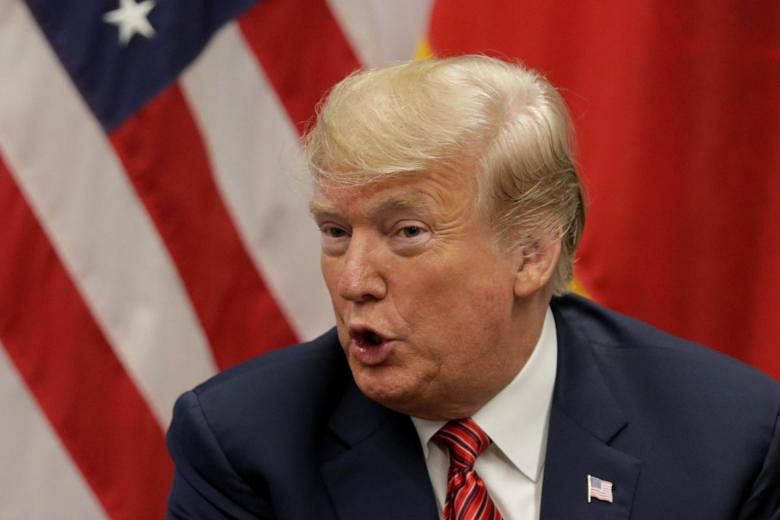WASHINGTON (NYTIMES) - President Donald Trump on Tuesday (Dec 4) reassured German auto executives that he had no immediate plans to impose tariffs on their cars. He made the pledge in a meeting at the White House - hours after declaring himself a "Tariff Man" in a Twitter post.
The hastily organised meeting included representatives of BMW, Daimler and Volkswagen.
In Europe, there is a growing sense of dread that Trump will follow through on his repeated threats to impose tariffs of 25 per cent on imported cars and car parts if European automakers do not expand their operations in the United States.
The German carmakers described the talks as friendly, even if they produced no concrete result. Participants in the meeting said the risk of punitive tariffs on German cars seemed to have receded, at least for the moment.
"All signs are guiding to the right direction at the moment," said Peik von Bestenbostel, the chief spokesman for Volkswagen, who accompanied Herbert Diess, the chief executive, to Washington.
Bestenbostel added, "Nobody knows what the decision of the president may be."
Joerg Howe, the Daimler director of communications, who was in Washington with Dieter Zetsche, the Daimler chief executive, described the atmosphere as "really good".
Trump was cordial, and played down the risk of imposing tariffs quickly, according to administration officials and industry executives. A White House spokeswoman said that no long-term decisions had been made, describing the meeting as a discussion of how to create "a more friendly business environment".
Each of the automakers met separately with Cabinet officials, and highlighted commitments to create more jobs for American workers.
Only Volkswagen executives offered something new, saying the company was considering building a factory in the United States in addition to its existing plant in Chattanooga, Tennessee.
Volkswagen is also in talks with Ford about cooperating to build commercial light trucks, and possibly sharing the cost of new technologies, a company spokesman said.
The dissonance between Trump's public bellicosity toward foreign automakers and his more accommodating posture in private reflects his growing concern about the fallout of his confrontational trade policy.
Confusion over Trump's trade approach, including whether he has actually reached a trade truce with China and overall concerns about how his tariffs could hurt economic growth, helped contribute to a 3 per cent sell-off on Wall Street on Tuesday.
Since General Motors' announcement last month that it would idle five factories in North America, the White House, already juggling complex and uncertain trade negotiations with China, Mexico and Canada, has shown a diminishing interest in escalating trade tensions with Europe, according to several senior administration officials who spoke on the condition of anonymity because they were not authorised to discuss internal White House strategy.
The president is also concerned that if tariffs are imposed, German carmakers may retaliate by cutting jobs at their existing US plants, many of which are in states he won in the 2016 election. Several of his top advisers, including Larry Kudlow, the director of the National Economic Council, have urged him to back off his tariff threat.
Yet Trump could ultimately call for the levies if he does not think Europe is negotiating a trade deal in good faith.
The Commerce Department has been working on a report that could provide the legal basis for such tariffs, and the administration would most likely challenge the automakers to provide reasons they should not be imposed, said Peter Chase, a former US diplomat and a senior fellow at the German Marshall Fund of the United States in Brussels.
"They will say, 'What can we do to achieve the goals the president has without going down this road?'" Chase said.
BMW, Daimler and Volkswagen already build hundreds of thousands of cars in Alabama, South Carolina and Tennessee.
In recent weeks, the companies have dangled the prospect of additional investments.
BMW has said it could start building motors in the United States instead of importing them from Germany. Volkswagen has indicated it might manufacture electric cars in the United States.
But the automakers will not want to commit to opening new production lines unless the administration offers some certainty in return. To justify investments of billions of dollars, the car companies need assurances that US policy will not suddenly veer back into attack mode.
While BMW's headquarters are in Munich, its manufacturing centre of gravity has increasingly shifted to the United States and China. The BMW factory in Spartanburg, South Carolina, is the company's biggest production facility anywhere in the world.
The plant produced about 370,000 SUVs last year, of which about 68,000 were exported to China. BMW is the leading exporter of American-made vehicles to China.
Increasingly, though, Spartanburg has had to compete with China for BMW's favour. The Chinese government aggressively courted the Germans, agreeing earlier this year to allow the company to own 75 per cent of its joint venture in China rather than the usual 50 per cent.
China's punitive tariffs on American-made cars hit BMW as well as Daimler hard, cutting into sales of cars made in the Deep South - areas that voted heavily for Trump.
The meeting put the carmakers in a somewhat awkward position given they are effectively negotiating with a foreign government and bypassing the European Commission. The commission, the European Union's executive arm, has separately tried to defuse tensions with the United States, although with little visible success.
The German government expressed annoyance at the breach of protocol.
"Responsibility for trade policy negotiations lies with the European Commission," Steffen Seibert, a spokesman for Chancellor Angela Merkel of Germany, told reporters on Monday. "Not with national governments. And definitely not with the auto companies."

